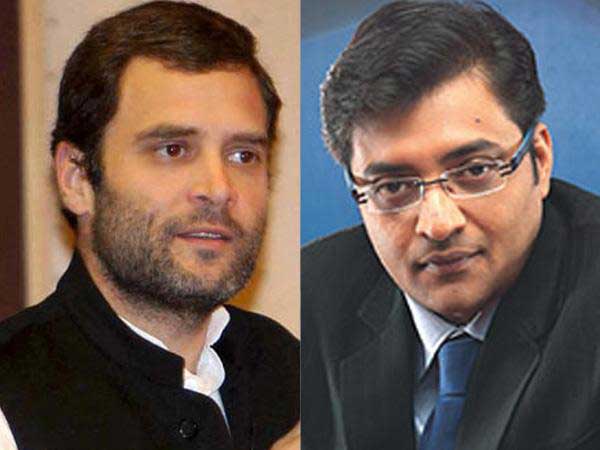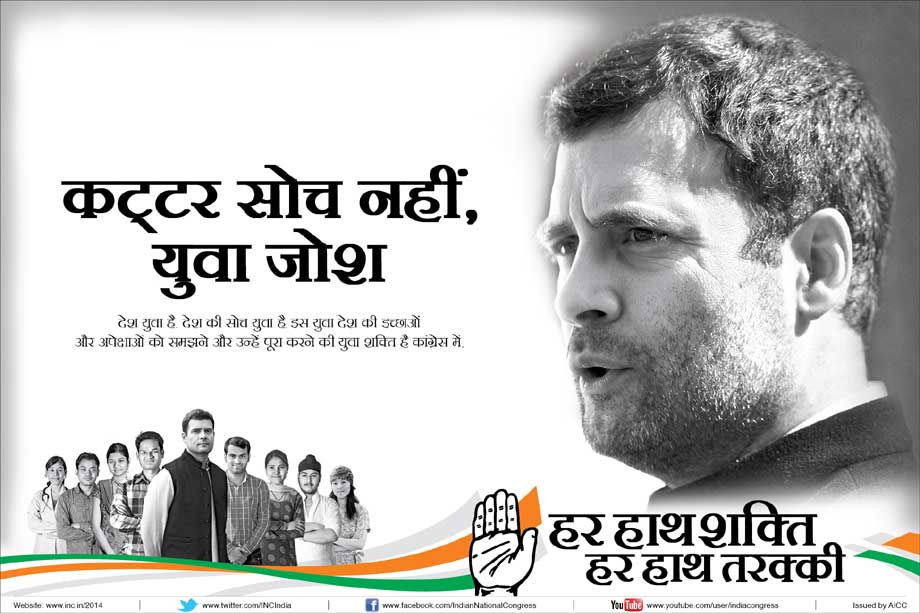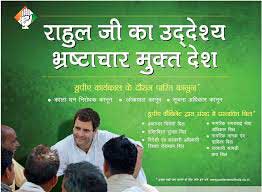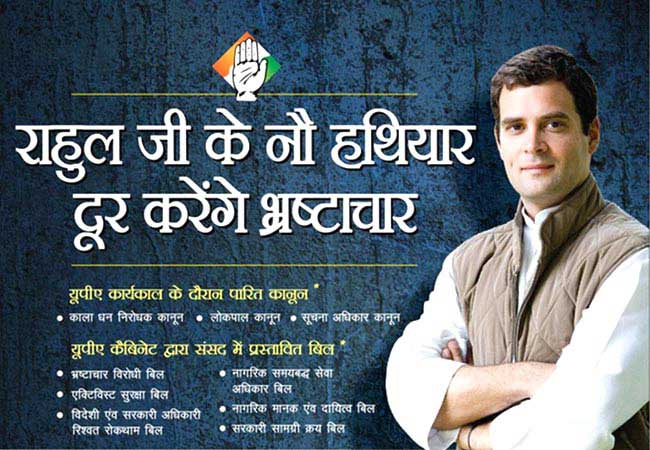Rahul Gandhi As The New King In Congress' Tragedy :
2014 Elections As A Cathartic Ritual Of Sacrifice
By Anuj Gupta
14 February, 2014
Countercurrents.org
This decade has seen the transformation of one of the most significant things that captured the Indian imagination on Television - the ‘Kyunki Saas Bhi Kabhi Bahu thi' phenomenon of the 2000s has been transformed into Arnab Goswami's equally dramatic and soap-operatic “news” of the 2010s. The latest trending topic on his show was of course what has been publicized as the greatest interview of the decade- ‘Frankly Speaking with Rahul Gandhi'. Supporters of Congress and Rahul baba were greatly impressed. They argue that he isn't into sensationalist nonsense that the likes of Goswami are interested in, which is why he sticks in his persistence for “fundamental issues” in the interview. However, even if you have a little bit of brain power, you realize how stupid the interview was. It was hardly sensationalist in the normal Goswami sense. In fact it was a very sensible interview, at least on Arnab's part. Rahul however showed us very clearly that he is not interested in politics at all and that just like his father, he is perhaps being forced into it by powers maternal-infernal. If anything, this interview could've been his attempt to jump out of this political jungle. Whether he is actually this stupid, or whether he had some hidden personal motives, we cannot determine. What should be of our concern however is - why did the Congress party take such a gamble? Of course they knew what was going to happen, of course their key strategists were aware that Arnab would ask him things other than what he has rote-learned for his public rallies. Why would they still engage in such a blunder then when the Congress is anyways at the most problematic time of its history? Initially, this interview looked like the Congress had simply given up and was handing the national elections on a platter to BJP and Modi. However, if one looks closely at the Congress' marketing activity right after this interview, deep patterns of a smart strategy begin to unfold.
A.K. Ramanujan once while discussing his methodology for analyzing what the “Indian” way of thinking is, said “The grammarian sees grammar in all things; I shall be true to my bias and borrow a notion from linguistics and try it for size”. Taking his cue, I, being a student of literature and culture, offer here a literary analysis of the socio-cultural text of Congress activity in the mass media over the past month. In literature, one of the most prominent genres is that of Tragedy, with famous examples being Sophocles' Oedipus Rex, Marlowe's Dr Faustus and Shakespeare's Hamlet. The genre of tragedy operates on a conflict between two worldviews, the old and the new. It dramatizes this conflict and presents a tragic downfall of one of those worldviews; usually the “old” and the ushering in of a “new” one. Studies in this domain, like those of Hegel, Neitzsche and Northop Frye, have revealed a connection between Tragedy and certain fundamental ways in which the human society functions. What is suggested is that the idea of cyclical, seasonal change (Winter to Spring) i.e. idea of death followed by rebirth is a deep structural archetype embedded in the human mind. Socially, this gets enacted through the idea of a ritualistic sacrifice, where a scapegoat that represents the “old” is chosen, and publically sacrificed which leads to a catharsis in the public and provides a sort of closure which paves the way for the “new“ to come in. While Tragedy focuses on the fall of the old, Comedy picks up from there to celebrate the establishment of the new.
In my opinion, these old rituals and ways of thinking still operate today. Democratic elections become the site of such tussles between the two worldviews of the old government and the new one. In political terms this is known as an ‘anti-incumbency vote' where people periodically root out the old rulers to bring in new ones (One could hear Abhishek Singhvi loudly crying out ‘anti-incumbency, anti-incumbency' repeatedly when the Congress lost the recent Delhi, Rajasthan, Chattisgarh and Madhya Pradesh elections 4-0, as if this loss was not the Congress' fault but the people's fault for being anti-incumbent in their voting patterns).
What the Congress seems to be doing now strategically is that it is offering Rahul Gandhi as a new leader that is drastically different from the older Manmohan Singh led UPA 1and UPA 2, in order to draw in all the anti-incumbency votes against the Congress party back into the Congress itself, instead of them going outwards towards either the BJP or the AAP. In an almost Machiavellian move, the tragic “old king” is being replaced by a “new king” to satisfy the public's need for a cathartic ritual of sacrifice, but in the background, Congress will continue to remain as the over-arching power that controls both these leaders. I offer now an analysis of Congress's media campaign in the last few weeks to highlight this strategy of the Congress party.
Stage 1 : Implanting the words ‘Rahul Gandhi' into public consciousness

Rahul has been kept silent and out of the media's gaze over the last decade so that the public's angst against the Congress gets focused specifically towards Manmohan Singh's Congress only . In fact Rahul would often come up randomly and act as a rebellious prince working against UPA's tyranny like when he “influenced” the UPA to increase the cap of subsidized LPG cylinders from 9 to 12. Suddenly now Rahul comes and gives a public interview to Times Now during the dying embers of UPA 2 to position himself as a new voice. Even if it was a stupid interview, it subliminally planted the words “Rahul Gandhi” in the public's mind. During this interview, Rahul kept referring to himself in the third person constantly as ‘Rahul Gandhi Rahul Gandhi Rahul Gandhi' to enforce this subliminal coding. People were talking about the interview for days and even if they were critiquing him, they were still talking about him. If you saw the interview, the two large chunks of word groups that one retains after watching the interview are:
a) “Rahul Gandhi” ( a sign that evokes all the influence of the Nehru-Gandhi dynasty)b) “Urgent need to change the structures, democracy, empowerment of women, inclusive government, decentralization of power, R.T.I etc”
The reason he kept on repeating them as an answer to whatever Arnab might ask, was precisely to drill them into our minds, like an advertisement jingle that works through sing-song repetition.
Stage 2 : Advertisements The Congress party waited for around a week for the mud to settle down after the interview. When the negativity of the interview, i.e. all the humor around it had been strained, the only thing left in the public's mind would be the word group associations mentioned above-Rahul Gandhi and his bag full of political promises. If you've noticed, over the past few days, these ads and banners have been popping up both in physical form on roads and in virtual formats online.
1)” kattar soch nahi, yuva josh” (“Not orthodox thought, but youthful passion”)

In this simple slogan, ‘kattar soch' or orthodox thought becomes a signifier for all right wing oriented BJP-NDA ideology which cunningly gets projected as the “old” king as opposed to the actual old king - UPA 2. Rahul Gandhi bathed in a white light around youngsters appears as the ideal choice for the “new” king.
2) “ Rahul ji ka uddeshya, bhrashtachaar mukta desh” (“Rahul Ji's mission, a country rid of corruption”)

Corruption has been the central issue through which the Anna Hazare movement captured the imagination of the masses and through which the Aam Aadmi Party was formed as a new party that pushes for idealized, egalitarian politics. Rahul in this poster tries to appropriate all their work and ideology as his own. Rahul's Congress gets projected as a Congress that has been fighting for bringing in anti-corruption laws as opposed to Manmohan Singh's UPA fraught with a myriad of scams (read: 2G,3G, CWG, coal-gate etc).
3) “Rahul ji ke nau hathiyaar door karenge bhrashtachaar” (“Rahul ji's 9 weapons (the 3 laws and 6 bills that the UPA passed during its tenure) will end corruption”)

This slogan is the most interesting of them all. First they use the word “Hathiyaar” or weapon. Usually it's the NDA who uses weapons like swords and bow and arrows in its rath yatra campaigns to create a sense of continuity between itself and the divine warriors and rulers of Hindu mythology. Congress constantly attacks this trait of the BJP by talking about how this mindset leads to things like the Godhra riots 2002. In this poster, Congress shows how it too has weapons, however unlike the BJP, their weapons are in the form of laws and legislations that work against corruption. Of course by evoking corruption again they seek to drink from the pool of anti-corruption desires created by the AAP.
Together then all three posters, project Rahul Gandhi as the new king that has come to replace the old one. His newness lies in the fact that he doesn't have the negative traits of both kinds of the “old” kings – the NDA and the UPA. Secondly, he also gets projected as someone who already has all the positive traits of the other emerging new king- the AAP. The presence of the Gandhi name (not in print but through Rahul Gandhi's face itself) adds onto this heady brew by evoking decade old connections to Mahatma Gandhi, an almost God like figure in the Indian social cosmos.
Stage 3: Challenging Modi on his home turf
All this subliminal buildup finally led to a climatic showdown last Saturday when Rahul Gandhi did the unthinkable when he went and gave a speech on Modi's home turf! The strongest contender for 2014 at the moment seems to be Modi and Rahul Gandhi is often taunted as being afraid of him. All that seems to have changed through this new strategy that the Congress has adopted. Rahul in his speech directly attacked what has been Modi's strongest point in his Prime Minsterial C.V. – Gujarat and its development. He talked about how Gujarat in Modi's motto of economic progress is focusing only on the rich upper and middle classes and ignoring the poor. Modi's speeches have also always been critical of the Nehru-Gandhi alliance and dynasty politics in general for the failures of the Indian nation. He often argues that leaders like Sardar Vallabhai Patel were the true fathers of the Indian nation but their thoughts and works have been ignored by the Congress governments for decades. Modi projects himself as an ideological descendant of this line of “true” Indian politicians while he rejects those that belong to the Nehru-Gandhi line. In a very strong attack, Rahul in his speech yesterday chided Modi for using Vallabhai Patel's name as mere tokenism (a little hypocritical of course for someone who runs around everyday with the Gandhi name tied around his neck). He suggested that while Modi is merely wasting money in building a huge statue for Patel, it is Rahul's Congress that has truly imbibed both Gandhi as well as Patel's thoughts in its functioning.
The three major powers in the run up for the 2014 national elections are the BJP, the Congress and the AAP. “Rahul Gandhi” as a semiotic system is being represented in the mass media today as a transcendental hybrid with signs that present him as a synthesis of all that is “good” in the Indian political scenario and also as that which is constantly working against all that is “bad” in this system. Thus, in the past one month, as part of Congress's desperate attempts to retain national power, he has been projected as -
a) In terms of the Congress Party : an inheritor of the Nehru-Gandhi Congress dynasty, but simultaneously very different from the corrupt UPA 1 and 2.
b) In terms of the Bhartiya Janata Party : a strong critic of sectarian, right wing, “kattar” politics who simultaneously does have all the good traits that this political doctrine offers in terms of his appropriation of Sardar Vallabhai Patel.
c) In terms of the Aam Aadmi Party : a sympathizer who appreciates their efforts and ideology but also realizes that they are new to the political system which is why they might be ineffective in realizing their ideas, something that he, with all his influence can easily do.
What remains to be seen is how the Indian public interprets this semiotic system that is “Rahul Gandhi” when they go to vote this summer.
Anuj Gupta is currently pursuing a Master’s degree in English Literature from St. Stephen’s College, University of Delhi. He is a member of the editorial team for Ivory Tower, a journal of poetry. His research interests include mythology, pop culture, cultural studies and modern philosophy. Apart from being an amateur literary researcher, he is also an independent musician and a freelance guitar teacher. He may be contacted at [email protected]
Comments are moderated
